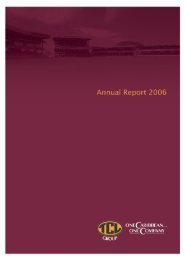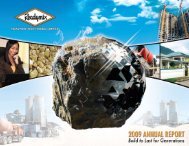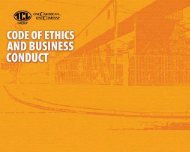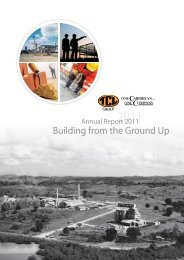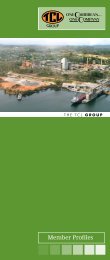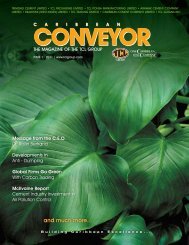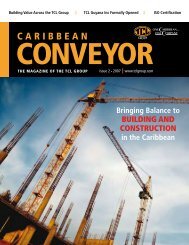A Time To Build Caribbean Cement Company Limited Annual ...
A Time To Build Caribbean Cement Company Limited Annual ...
A Time To Build Caribbean Cement Company Limited Annual ...
You also want an ePaper? Increase the reach of your titles
YUMPU automatically turns print PDFs into web optimized ePapers that Google loves.
the worldwide increases in freight, steel and steel products also continued to put upward<br />
pressure on costs. In summary, while the fixed cost elements were absorbed to some extent<br />
by increasing production volumes, the direct unit cost of production increased by 18%, and<br />
operating profit as a percentage of sales fell to 16%, compared with 20% in 2003.<br />
Finance costs on the other hand reduced over 2003 as a result of the following two key factors, viz.:<br />
• The foreign exchange rate remained relatively stable over the year, depreciating by 2%<br />
compared to the 20% devaluation in 2003. The loss on currency exchange was $3M<br />
compared to the $100M in 2003.<br />
• Interest expenses reduced by $52M, primarily as improved cash flows reduced the reliance<br />
on borrowings to fund working capital.<br />
Additionally, there was a reduction in the taxation charge as, in accordance with the<br />
International Financial Reporting Standard, Jamaica Gypsum and Quarries <strong>Limited</strong> (JGQ)<br />
recognized a deferred tax asset amounting to $231M arising from unused tax losses, based on<br />
an assessment that future taxable profits will be available against which these losses can be<br />
utilized.<br />
Over the last three years a Revitalization Programme has been instituted at JGQ aimed at<br />
improving productivity and quality and returning the <strong>Company</strong> to viability. The programme<br />
has included a re-capitalization of the rolling stock, improvements to crushing plant and<br />
environmental control equipment and the introduction of new management and work systems<br />
that has resulted in a revitalized work force and significant improvements in the quality of the<br />
product. In addition, the port facilities have been upgraded and marketed successfully for use<br />
by third parties for the export of aggregates. In fact, the <strong>Company</strong> received the award for the<br />
largest bulk exports in 2004. Jamaica Gypsum and Quarries port facilities, and Carib <strong>Cement</strong>’s<br />
cement and coal wharfs, are all fully in compliance with the International Ship and Port Facility<br />
Security (ISPS) Code.<br />
The <strong>Company</strong>’s balance sheet strengthened during the year and significant pay downs on<br />
outstanding loans were made. Working capital became positive for the first time since 1996.<br />
Market Review<br />
Carib <strong>Cement</strong> achieved record total domestic sales for the year 2004, ending the year at 803,855<br />
MT, 33% over the prior year’s performance. This represents an additional 198,364MT of cement<br />
sold by the <strong>Company</strong> in 2004 over the previous year. The domestic market grew by 13% over<br />
the previous year. The cumulative annual growth rate in domestic cement sales has averaged<br />
8% over the last three years, compared with 5% over the previous ten years.<br />
In their final determination in July 2004, the Anti-Dumping & Subsidies Commission<br />
recommended the imposition of a safeguard duty of 25.83% on cement entering the Jamaican<br />
market. This recommendation was based on the highest FOB price on record for cement<br />
imported into the Jamaican market and, when added to the 15% CET, would result in total<br />
duties payable on cement imports of 40.83%.<br />
However, the Government of Jamaica, while accepting the recommendations of the<br />
Commission, decided instead to increase the Common External Tariff (CET) on all cement<br />
imports to 40%. Approval for the adjustment of this duty was granted by Parliament in<br />
December 2004.<br />
In a more disciplined market place, Carib <strong>Cement</strong>’s market share improved to 93% compared<br />
with 77% in 2003. From December 2003, the <strong>Company</strong>’s monthly market share has been in the<br />
ninety percentiles and during the last quarter of 2004 the <strong>Company</strong> commanded 100% of the<br />
local market. This is the first time since the beginning of 2000 that the <strong>Company</strong> supplied the<br />
complete domestic market for such a period.<br />
The Montego Bay,<br />
Portmore and Mandeville<br />
depots continue to service<br />
the <strong>Company</strong>’s customers<br />
with depot sales now<br />
accounting for 30% of total<br />
sales. Plans are underway<br />
to further expand the<br />
network with the opening<br />
of a new depot in Spanish<br />
<strong>To</strong>wn by mid 2005, along<br />
with increasing the<br />
capacity of the Mandeville<br />
depot.<br />
Our new brand, Carib <strong>Cement</strong> Plus, was well received by contractors and premix concrete<br />
operators. Carib <strong>Cement</strong> Plus is a Portland Pozzolan <strong>Cement</strong> or ASTM Type 1P <strong>Cement</strong> and<br />
produces concrete that develops a lower heat of hydration, has higher later strengths and<br />
is more resistant to alkali and sulphate reactions. In addition, during the manufacturing<br />
process, less energy is required to produce this cement and less carbon dioxide is released<br />
to the atmosphere, reducing the greenhouse effect. Carib <strong>Cement</strong>’s introduction of this<br />
blended cement is in line with international best practices subscribed to under the <strong>Cement</strong><br />
Sustainability Initiative (CSI). In February 2005, Carib <strong>Cement</strong> Plus was launched in 42.5kg<br />
sacks and has also received a very positive response from this market segment.<br />
Operations Review<br />
<strong>Cement</strong> production totalled a record 808,070MT 33% or 200,388MT over the 2003<br />
performance. Clinker production totalled 605,814MT. This was 4,834MT more than the<br />
performance in 2003 and also established a new production record. This performance, which<br />
was in spite of the interruptions arising from Hurricanes Charlie and Ivan and the frequent<br />
power outages that continued thereafter, has validated the previous expenditure in 2003 on<br />
refurbishing the cement milling areas, the training of our staff and improving the information<br />
and work systems in the plant through the Manufacturing Excellence Transformation<br />
Programme.<br />
2004 ANNUAL REPORT 14 15<br />
2004 ANNUAL REPORT



